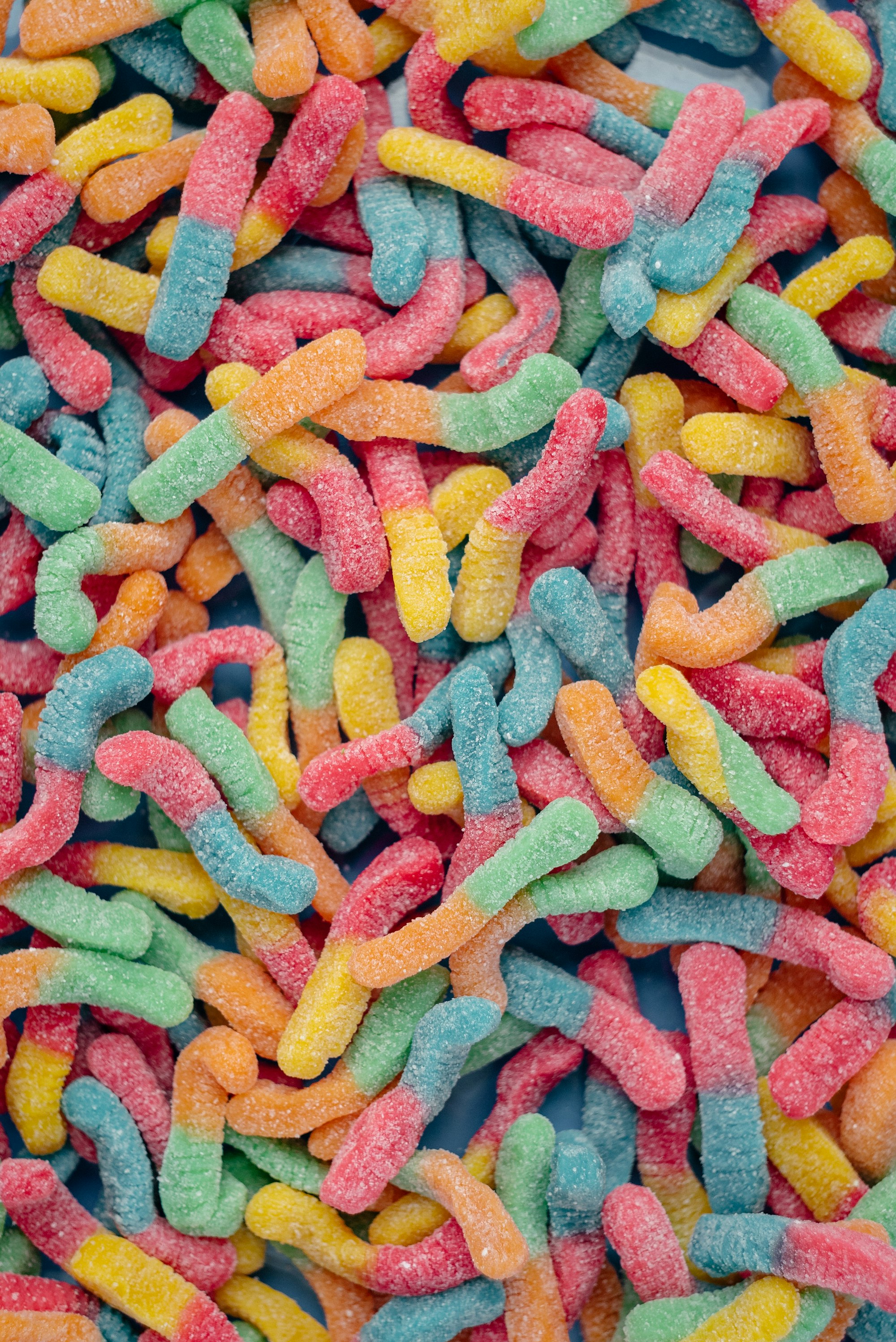Dogs are known for their friendly and playful nature, making them great companions. But can they eat gummy worms? Let's figure it out.
Gummy worms contain sugar, corn syrup, gelatin, and artificial flavors. This might be safe for us, however, it can cause problems for dogs. For example, too much sugar can lead to health issues like weight gain, diabetes, dental problems, and digestive disturbances.
Plus, the artificial flavors and colors might cause allergies or stomach upset in some dogs.
Also, gummy worms are hard to chew and digest. So, there is a risk of choking or intestinal blockage if a dog swallows it.
Therefore, it's best to avoid feeding gummy worms to our furry friends. Instead, give healthier treats made especially for dogs that provide necessary nutrients without any harm.

Can Dogs Eat Gummy Worms?
When it comes to dogs and gummy worms, it's important to understand whether these chewy treats are safe for our furry friends. Gummy worms might seem harmless, but can dogs eat them? Let's explore this topic in detail.
While dogs can technically eat gummy worms, it is not recommended. Gummy worms are high in sugar and artificial ingredients that can be harmful to dogs. Consumption of too much sugar can lead to obesity, diabetes, dental issues, and gastrointestinal problems in dogs. Furthermore, the gelatin and other additives found in gummy worms may not agree with a dog's digestive system, potentially causing stomach discomfort or even an allergic reaction.
In addition to these concerns, gummy worms present a choking hazard due to their chewy texture. Dogs may not properly chew the gummy worms, leading to blockages in their throat or digestive tract.
It's important to note that every dog is different, and some may have a higher tolerance for certain foods. However, as responsible pet owners, it's best to avoid feeding gummy worms to our canine companions to ensure their overall health and well-being.
While it might be tempting to share this sugary treat with your furry friend, it's better to stick to dog-friendly options when it comes to snacks. There are plenty of safe and tasty alternatives available specifically designed for dogs, such as chew toys and treats made from natural ingredients.
Do gummy worms count as survival food for dogs? Well, let's just say they won't be winning any gold medals in the 'healthy snacks for canines' category.
Risks and Potential Dangers
Gummy worms may appear innocent, but there are huge risks and potential threats connected to feeding them to your dog.
- Choking Risk: Gummy worms have a sticky texture, which could easily get stuck in a pooch's throat, potentially leading to choking.
- Gut Blockage: The ingredients in gummy worms, such as sugar and gelatin, could create a gluey mass in the intestines, potentially causing blockages that could be fatal for your furry buddy.
- Artificial Sweeteners: Certain gummy worms contain artificial sweeteners like xylitol, which is poisonous to dogs and can cause a drop in blood sugar levels or even liver damage.
- Digestive Discomfort: Dogs have delicate digestive systems, and the high sugar content of gummy worms can lead to diarrhea, vomiting, or other tummy issues.
- Allergies: Dogs can become allergic to some of the ingredients in gummy worms, possibly leading to allergic reactions such as itching, swelling, or difficulty breathing.
- Nutritional Value: Gummy worms provide no nutritional benefits for dogs and are just empty calories, which can lead to weight gain and potential health problems.
Regardless of these dangers and potential risks associated with gummy worms, it is essential to remember that each pup's tolerance and response can vary. Thus, consulting a vet before introducing any new foods is essential.
Pro Tip: Keep your canine safe and healthy by sticking to a balanced diet created for their specific needs. It's always better to avoid giving them human treats.

Ingredients to Avoid
When it comes to gummy worms, we must be careful of the ingredients to keep our pup safe and healthy. Too much sugar can result in obesity, diabetes, and dental issues. Artificial colors can cause allergic reactions, and preservatives may lead to digestive problems.
Therefore, it's important to be aware of the potential risks associated with these yummy treats. Here are a few things to keep an eye out for:
- Sugar: Too much can cause obesity, diabetes, and dental problems.
- Artificial Colors: These can trigger allergic reactions in dogs.
- Preservatives: Some preservatives may cause digestive problems in dogs.
Surprisingly, gummy candies have been around since the early 1900s and became popular quickly. The modern gummy worm was created by Hans Riegel Sr., founder of Haribo candy company in Germany. Though these treats are loved globally, they are not suitable for our four-legged friends!
Alternatives to Gummy Worms for Dogs
There are many suitable alternatives to gummy worms for dogs. These options provide similar textures and flavors without any harmful ingredients. Here are five alternatives to consider:
- Natural chew toys: Instead of gummy worms, offer your dog natural chew toys made from materials like beef cheeks or other chews. These toys not only satisfy your dog's need to chew but also promote dental health.
- Frozen fruits and vegetables: Dogs can enjoy a variety of frozen fruits and vegetables as a healthy snack. Carrots, apples, and blueberries are excellent choices. Make sure to cut them into small, bite-sized pieces before offering them to your dog.
- Dog-friendly treats: Look for specially formulated dog treats made from high-quality ingredients. There are numerous options available that provide different flavors and textures to keep your dog entertained and satisfied.
- Dental chews: Dental chews are designed to promote oral hygiene while also serving as a tasty treat for dogs. These chews help reduce plaque and tartar buildup, promoting better dental health for your furry friend.
- Homemade treats: Consider making homemade treats for your dog using safe ingredients. Recipes that include ingredients like rolled oats, peanut butter, and pumpkin can be a nutritious and delicious alternative to gummy worms.
For additional details, it's worth noting that some fruits like grapes and raisins, as well as certain vegetables like onions and garlic, can be toxic to dogs. Always consult with your veterinarian before introducing new foods into your dog's diet.
To sum up, there are various alternatives to gummy worms for dogs, including natural chew toys, frozen fruits and vegetables, dog-friendly treats, dental chews, and homemade treats. These options provide safe and enjoyable alternatives to satisfy your dog's chewing needs. Remember to prioritize your dog's health and consult with your veterinarian for personalized suggestions.
Dogs deserve safe and healthy treats, but they'll probably never crack the code on gummy worms - unless they learn how to work a vending machine.

Safe and Healthy Treat Options
Treats like jerky strips and bully sticks are handy. They keep your pet entertained and promote oral hygiene. Natural treats like carrot sticks and apple slices provide a crunchy texture and vitamins and minerals. Frozen treats, made with ingredients like yogurt or peanut butter, can be a yummy summer snack.
Think about your pup's dietary needs when choosing treats. Some dogs have allergies or sensitivities. Ask your vet for advice.
Gummy worms for dogs are not safe. Too much sugar and a choking hazard. Choose healthier options. Look out for your furry friend!
Conclusion
The question is, can dogs eat gummy worms? It's not recommended. Gummy worms contain too much sugar and artificial ingredients which could be bad for a dog's health.
Excess sugar can lead to weight gain and tooth decay. Artificial ingredients can make a dog have an upset stomach or worse.
For optimum health, give your pup natural and nutritious treats. Treats made for dogs make sure they get the right nutrition and don't have any bad ingredients.
If your pup wants something chewy, try dog-friendly alternatives. Chew toys or treats made with natural ingredients like dried fruits and vegetables are safer and healthier for your pup.
Remember, dogs have different nutritional needs than people. We want our furry friends to be healthy and happy. So, choose dog-safe snacks.

Frequently Asked Questions
1. Can dogs eat gummy worms?
While gummy worms may not be toxic to dogs, they are not recommended for consumption. Gummy worms contain high amounts of sugar, artificial flavors, and colors that can be harmful to dogs if consumed in large quantities.
2. What happens if my dog eats gummy worms?
If your dog accidentally eats a small piece of gummy worm, it is unlikely to cause any serious harm. However, if consumed in large quantities, gummy worms can lead to gastrointestinal upset, such as vomiting and diarrhea, due to the high sugar content.
3. Are there any safer alternatives to gummy worms for dogs?
Yes, there are many safe and healthy alternatives to gummy worms that you can give to your dog as treats. Some options include small pieces of fresh fruits like apple or banana, baby carrots, or specially-made dog treats.
4. Can small amounts of gummy worms be given as an occasional treat?
It is generally not recommended to give gummy worms as a treat to your dog, even in small amounts. The high sugar content can contribute to dental issues, obesity, and other health problems in dogs. It's best to opt for healthier alternatives.
5. What should I do if my dog accidentally consumes a large amount of gummy worms?
If your dog has ingested a significant amount of gummy worms, monitor them for any signs of discomfort or distress. Contact your veterinarian for guidance, as they may recommend inducing vomiting or taking other necessary steps depending on the situation.
6. How can I prevent my dog from accessing gummy worms?
To prevent your dog from getting hold of gummy worms, make sure to store them securely in a place that is inaccessible to your pet. Keep all sugary treats out of reach to avoid any potential risks to your dog's health.




